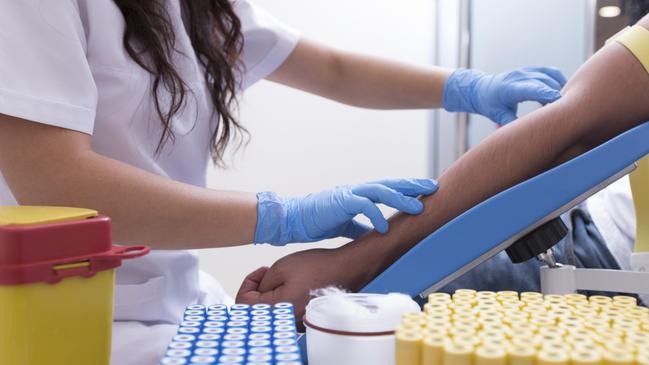Blood test trial to better predict who needs chemotherapy
A NEW blood test that detects “invisible” cancer cells left in the body after surgery, is being trialled to help more patients avoid unnecessary chemotherapy and its toxic side effects.

VIC News
Don't miss out on the headlines from VIC News. Followed categories will be added to My News.
A NEW blood test that detects “invisible” cancer cells in the body after surgery, is being trialled to help more patients avoid unnecessary chemotherapy and its side effects.
Chemotherapy is routinely given after a tumour is surgically removed because there is no reliable way to detect whether residual cancer cells remain in the body and which patients will relapse.
But a “liquid biopsy” that measures microscopic cancer cells from anywhere in the body is being tested in 2500 Australian patients with ovarian, bowel and pancreatic cancers.
NIMA AND DAWA RELAX IN KILMORE AHEAD OF SEPARATION SURGERY
The aim of the national trial, led by the Walter and Eliza Hall Institute of Medical Research, is to consider whether the blood test can indicate who is at high or low risk of cancer returning.
This will dictate who can avoid chemotherapy, and in what patients — and at what dose — it is essential to help prevent the cancer returning.
Lead WEHI researcher and oncologist Associate Professor Jeanne Tie said they worked with top US cancer hospital the John Hopkins Kimmel Cancer Centre to develop the test that measured circulating tumour DNA, the genetic material cancer sheds into the blood.
Associate Prof Tie said in trials of bowel cancer patients over the past three years, the test was able to differentiate patients as being at high or low risk of their cancer returning, based on the level of residual cancer cells in the blood, which could not be seen by PET or CAT scan.
“Now we want to answer two new questions with this trial,” Associate Prof Tie said.
“In those at low risk, can we use less chemotherapy without compromising their outcome?
“In those with a high risk of relapse, can we reduce their intensive treatment?”
About 450 patients have so far been recruited to the trial, and they will be followed for five years to check whether a low-risk blood test means patients can safely avoid chemo.
“A lot of patients ask once they’ve finished chemo; `Doctor, do I still have cancer left behind?’ Now, I need to follow them for five years to answer that,” she said.
“This blood test could give us important extra information.”

As a senior researcher at the Bionics Institute, Professor Hugh McDermott trawled the scientific literature when deciding whether chemotherapy was necessary after being diagnosed with early stage bowel cancer last year.
His ctDNA blood test showed he was at low risk of the cancer returning, allowing him to avoid chemotherapy and be back at work within weeks.
“This is a test that could make a huge difference to people’s lives,” Prof McDermott said.
“If you can avoid chemotherapy, there is tremendous economical and emotional cost saving.”


